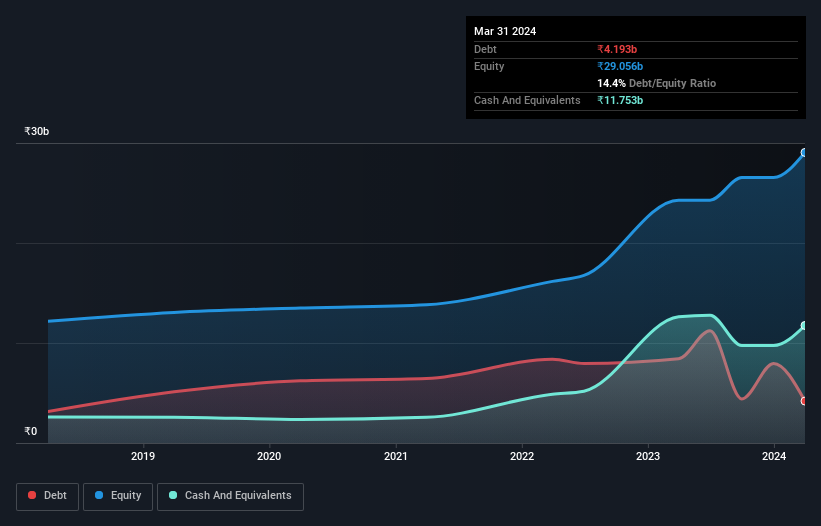- India
- /
- Healthcare Services
- /
- NSEI:MEDANTA
We Think Global Health (NSE:MEDANTA) Can Manage Its Debt With Ease
David Iben put it well when he said, 'Volatility is not a risk we care about. What we care about is avoiding the permanent loss of capital.' So it seems the smart money knows that debt - which is usually involved in bankruptcies - is a very important factor, when you assess how risky a company is. We note that Global Health Limited (NSE:MEDANTA) does have debt on its balance sheet. But the more important question is: how much risk is that debt creating?
When Is Debt Dangerous?
Debt and other liabilities become risky for a business when it cannot easily fulfill those obligations, either with free cash flow or by raising capital at an attractive price. If things get really bad, the lenders can take control of the business. While that is not too common, we often do see indebted companies permanently diluting shareholders because lenders force them to raise capital at a distressed price. Of course, debt can be an important tool in businesses, particularly capital heavy businesses. When we examine debt levels, we first consider both cash and debt levels, together.
View our latest analysis for Global Health
What Is Global Health's Debt?
You can click the graphic below for the historical numbers, but it shows that Global Health had ₹4.19b of debt in March 2024, down from ₹8.42b, one year before. However, its balance sheet shows it holds ₹11.8b in cash, so it actually has ₹7.56b net cash.

How Strong Is Global Health's Balance Sheet?
According to the last reported balance sheet, Global Health had liabilities of ₹6.18b due within 12 months, and liabilities of ₹7.81b due beyond 12 months. Offsetting this, it had ₹11.8b in cash and ₹2.15b in receivables that were due within 12 months. So these liquid assets roughly match the total liabilities.
Having regard to Global Health's size, it seems that its liquid assets are well balanced with its total liabilities. So while it's hard to imagine that the ₹325.6b company is struggling for cash, we still think it's worth monitoring its balance sheet. While it does have liabilities worth noting, Global Health also has more cash than debt, so we're pretty confident it can manage its debt safely.
Another good sign is that Global Health has been able to increase its EBIT by 27% in twelve months, making it easier to pay down debt. The balance sheet is clearly the area to focus on when you are analysing debt. But it is future earnings, more than anything, that will determine Global Health's ability to maintain a healthy balance sheet going forward. So if you're focused on the future you can check out this free report showing analyst profit forecasts.
But our final consideration is also important, because a company cannot pay debt with paper profits; it needs cold hard cash. While Global Health has net cash on its balance sheet, it's still worth taking a look at its ability to convert earnings before interest and tax (EBIT) to free cash flow, to help us understand how quickly it is building (or eroding) that cash balance. Over the most recent three years, Global Health recorded free cash flow worth 54% of its EBIT, which is around normal, given free cash flow excludes interest and tax. This free cash flow puts the company in a good position to pay down debt, when appropriate.
Summing Up
We could understand if investors are concerned about Global Health's liabilities, but we can be reassured by the fact it has has net cash of ₹7.56b. And we liked the look of last year's 27% year-on-year EBIT growth. So is Global Health's debt a risk? It doesn't seem so to us. Above most other metrics, we think its important to track how fast earnings per share is growing, if at all. If you've also come to that realization, you're in luck, because today you can view this interactive graph of Global Health's earnings per share history for free.
When all is said and done, sometimes its easier to focus on companies that don't even need debt. Readers can access a list of growth stocks with zero net debt 100% free, right now.
New: Manage All Your Stock Portfolios in One Place
We've created the ultimate portfolio companion for stock investors, and it's free.
• Connect an unlimited number of Portfolios and see your total in one currency
• Be alerted to new Warning Signs or Risks via email or mobile
• Track the Fair Value of your stocks
Have feedback on this article? Concerned about the content? Get in touch with us directly. Alternatively, email editorial-team (at) simplywallst.com.
This article by Simply Wall St is general in nature. We provide commentary based on historical data and analyst forecasts only using an unbiased methodology and our articles are not intended to be financial advice. It does not constitute a recommendation to buy or sell any stock, and does not take account of your objectives, or your financial situation. We aim to bring you long-term focused analysis driven by fundamental data. Note that our analysis may not factor in the latest price-sensitive company announcements or qualitative material. Simply Wall St has no position in any stocks mentioned.
Have feedback on this article? Concerned about the content? Get in touch with us directly. Alternatively, email editorial-team@simplywallst.com
About NSEI:MEDANTA
Flawless balance sheet with moderate growth potential.
Market Insights
Community Narratives




